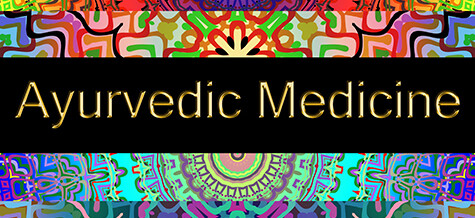
Little did I know twenty years ago that an introductory visit to an Ayurvedic practitioner in Boston would help set me on a path of feeling better! At that session, I filled out a fairly comprehensive questionnaire about my dietary habits. I was feeling quite proud of myself in that I felt my answers would reveal a healthy lifestyle. I was eating tons of salads and juicing. My snacks mostly consisted of nibbling on raw veggies. Yet, I was dragging, with low energy. After a few minutes of evaluating my questionnaire, the practitioner declared that I had mostly a “Pitta” constitution. Huh? And there began my education in Ayurvedic Medicine.
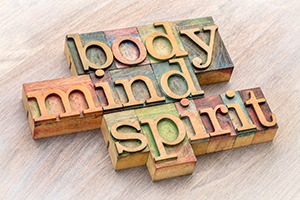 The take away that day was this: For my body type (according to this ancient Indian medicine), my body responds more favorably to cooked, warm foods for anchoring purposes. I started cooking more of my greens and my snacking turned to hot teas. Once I started feeding myself warmer, cooked foods (even in the summer!) my energy soared! Ever seen photos of people in India drinking hot tea during hot days? There’s a reason! Also, with a few simple adjustments to my diet, the frequency of my sinus infections reduced dramatically!
The take away that day was this: For my body type (according to this ancient Indian medicine), my body responds more favorably to cooked, warm foods for anchoring purposes. I started cooking more of my greens and my snacking turned to hot teas. Once I started feeding myself warmer, cooked foods (even in the summer!) my energy soared! Ever seen photos of people in India drinking hot tea during hot days? There’s a reason! Also, with a few simple adjustments to my diet, the frequency of my sinus infections reduced dramatically!
Today, it’s my pleasure to introduce you to my local Ayurvedic practitioner, Helgrid Randolph.
She’s part of my “village,” or team of holistic healthcare advisers. Having moved to the dry, arid climate of Denver several years ago, she was able to identify that my sluggish body needed more moisture. Sometimes water just doesn’t do it. So I supplement my diet with more olive and coconut oils in my food. Little adjustments, big gains! Today, Helgrid is going to speak to the basic principles of Ayurvedic Medicine.
From Helgrid: An Intro to Ayurveda
Why Ayurveda?
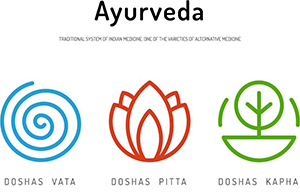 Literally the “science of life,” Ayurveda is the ancient Indian medical system. One of its essential principles is to live in harmony with both the world around us and with the world within us.
Literally the “science of life,” Ayurveda is the ancient Indian medical system. One of its essential principles is to live in harmony with both the world around us and with the world within us.
This can be simply expressed: “as above so below – as within so without.” Consider that whatever happens outside of ourselves affects what happens within us. Conversely, whatever happens within us affects whatever happens outside of us. For example, if it is cold outside, we are likely to feel the effects internally as physical and even emotional discomfort. Hearing about a disturbing event might leave us emotionally and even physically disturbed. Our anger is able to affect the people around us.
What does “Vedic” mean?
Vedic refers to the ancient texts, called Vedas. These very old texts were written in Sanskrit. The Vedas provide us with ancient wisdom and knowledge of Ayurveda, Yoga, Jyotish (Vedic Astrology), Vastu (Indian Feng Shui), and much more. When we talk about Vedic Sciences this is what we refer to, calling these different sciences also sister sciences as in the past they were never practiced by themselves, always in conjunction with each other addressing the whole life.
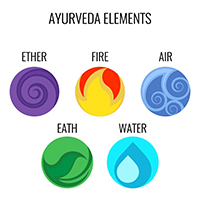 Ayurvedic diagnosis relies on observing the relationship of the three doshas: Vata, Pitta, and Kapha. Doshas are considered bio-energies that rule our bodies as well as the world around us.
Ayurvedic diagnosis relies on observing the relationship of the three doshas: Vata, Pitta, and Kapha. Doshas are considered bio-energies that rule our bodies as well as the world around us.
A quick overview of each of these doshas:
Vata = ether (space) and air
Vata relates to: the nervous system, responsible for all movement in mind and body, control and coordination of the body, initiating movement and transmitting sensations, regulating respiration, psychological processes, speech, waste removal from the body, etc.
Pitta = fire and water
Pitta relates to: metabolic and endocrine system, bile and other digestive enzymes; body heat (temperature), all transformations in body and mind; digestion and metabolism of food (hunger, thirst), and the sensory organs of the body (e.g. visual perception), etc.
Kapha = water and earth
Kapha relates to: immune system, gives stability to structure of the body, connective tissue (tendons, mucus, synovial fluid), etc. It lubricates the body, provides moisture to the skin, heals wounds.
Looking deeper, these three doshas are made up by the five elements: ether, air, fire, water, and earth, in differing amounts.
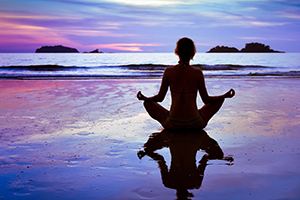
Yoga including breathing and body postures are also very effective!
Each of us has a unique combination of these three doshas, which make up our respective constitutions. Our unique combination of the doshas and their elements makes us who we are.
We are born with this constitution and it is how we were meant to be. And then life happens and we forget who we really are and what makes us happy.
Ayurveda leads us back to our natural constitution, to our true self. It teaches us to use self-observation to be aware of the functions of our body and mind, as well as our desires and attachments, through self-observation.
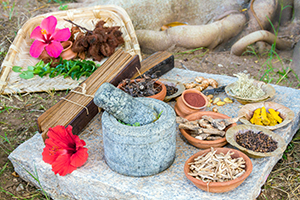
Herbs are instrumental and customized to each person in Ayurvedic Medicine.
Rather than a “one size fits all” approach to diagnosis and treatment, Ayurveda considers symptoms based on an individual’s constitution. For example, two people may suffer from nausea, but for very different reasons. Instead of treating just the symptom, an Ayurvedic practitioner looks first to the root of the condition. For this reason, Ayurvedic herbs and dietary recommendations are unique for each individual.
Once we know which food gives us gas or bloating, we can avoid those foods. Once we realize that coffee every morning makes us irritable and nervous or that meat is difficult to digest, we can change. Once we realize that watching TV every night makes us agitated and robs us of a good night sleep, once we see the connection of checking our phone every couple of minutes, we can follow a different path. Discovering our lack of grounding, or disconnection from nature, and the stressors of daily life that contribute to irritability and fatigue, are all important steps to wellness.
When we seek physical balance, it is easier to achieve mental balance. Ayurveda gives us simple tools to support ourselves on the journey back to our true nature.
In my practice, I combine the tools of Ayurveda and Yoga in order to help my clients balance body, mind and soul.
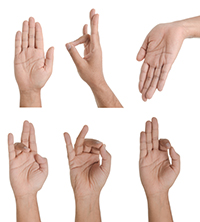
Mudras or hand postures, are beautifully useful and can be done on one’s own!
Some of these tools are:
- Herbs
- Oils
- Cleansing practices
- Pranayama (breathing practices)
- Mudra (hand postures)
- Asana (body postures)
My practice is in Denver, Colorado, where I also teach workshops and classes on Ayurveda. Please feel free to contact me with questions about Ayurveda, consultations and treatments. 720-883-7990 or helgrid@heartofayurveda.com.
Biography
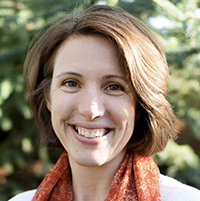 Helgrid is a native of Austria who now calls Denver, Colorado home. She is a NAMA certified Ayurveda practitioner and IAYT certified Yoga therapist. The Vedic Sciences have changed her life on a deep level and continue to do so. Helgrid received her medical degree (MD) from the University of Vienna, Austria.
Helgrid is a native of Austria who now calls Denver, Colorado home. She is a NAMA certified Ayurveda practitioner and IAYT certified Yoga therapist. The Vedic Sciences have changed her life on a deep level and continue to do so. Helgrid received her medical degree (MD) from the University of Vienna, Austria.
Professional Offerings:
- Consultations: Helgrid supports people regain their balance through Ayurveda and Yoga.
- Teaching: She is part of the faculty at Prana Yoga and Ayurveda Mandala in Denver.
- Workshops: Helgrid partners with Amit Garg to offer workshops on various topics around Ayurveda, Yoga and Jyotish.
The integration of Jyotish (Vedic Astrology) and Vastu (Indian Feng Shui) into her work through the partnership with Amit Garg (Vedic Astrologer, Vastu consultant) is immensely helpful in empowering her clients to bring balance into their lives.
Her vision is to spread awareness of the great potential of Yoga and Ayurveda as a way of life for personal well-being and prevention of disease, and also for supporting healing in conjunction with western medicine.
Helgrid and Amit just published a book called “Yoga & Jyotish”, which helps to find a supportive Yoga practice according to ones Vedic astrological chart. You can order this book at lulu.com:
http://www.lulu.com/shop/amit-garg-and-helgrid-randolph/yoga-jyotish/paperback/product-23577846.html
Christy’s Summary
If you live in the Denver area, I highly recommend that you contact Helgrid if you are interested in improved health! For those of you who live elsewhere, there are many wonderful, professionals all over the U.S. Click here to find one near you.
Since seeing Helgrid, I’ve noticed improved energy through the use of Ayurvedic herbs and mudras (hand postures) Spring and Fall are perfect times for detoxes. I’ve signed on for a nine-day cleanse under Helgrid’s supervision this October. I will follow up with my experience for all of you readers then!
I hope that through my website and the posts, I’ve introduced you to a larger world of healing modalities. Ayurvedic Medicine is yet another beautiful, “treat the individual person” healing practice. Some out there embrace a totally holistic protocol for themselves. Why not embrace the best that western medicine offers in a complimentary way to other types of healing, like Ayurveda? Cultures long before us have successfully treated and kept their people healthy. Why not embrace these practices and build our “villages” of practitioners for total health? I’m IN!
Peace and Good Health!
![]()
If you “Like” this post, I’d be thrilled if you’d share it.
JUL
